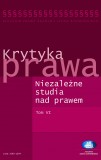O znaczeniu „faktu” w polskim języku prawnym i prawniczym
About the meaning of the word „fact” in the languages of legal acts and legal practitioners
Author(s): Michał SynoradzkiSubject(s): Semantics, Polish Literature, Ontology
Published by: Akademia Leona Koźmińskiego
Keywords: Fact; language of legal acts; legal practitions; meaning; sentence; situation; truth;
Summary/Abstract: The author of the article draws attention to certain semantic contradictions appearing in contexts where the word „fact” is used in the language of legal acts and the language of legal practitioners. These contradictions pertain, in particular, to the possibility of attributing some logically exclusive predicates, especially such as „true” & „untrue” and „existing” & „non-existing” to „fact”. This word is also key to an understanding of the legal notion of „truth”. The semantic collocation of „fact”, atypical for the expressions in general language, and the aforementioned predicates, suggests a specific and different meaning of the word „fact” in the language of legal acts and legal practitioners. „Fact” has been traditionally defined in Polish legal doctrine as a „fragment of reality”, so the stress was put on an ontological semantic component of the word. The author argues that such a notion of „fact”, in particular in the light of the legislator’s statements, may lead to language phenomena which are named by linguists as semantically „absurd” or „nonsense”. The pointlessness of expressions such as „untrue fact” or „non-existent fact” in the context of the general language consists of an inability to understand the meanings of these expressions. The author considers the possibility of regarding them as socalled semantic paradox, and the word „fact” itself as a „quasi-individual” name [nazwa quasi-indywiduowa] or a hypostasis. He draws attention to the point, generally ignored in the literature by legal practitioners, that the word „fact”, as corresponding to a certain situation, is always expressible in the form of a meaningful sentence. Moreover, the language of legal practitioners, especially the language of judicial decisions, always associates an approving assertion to the notion of „fact”. The author critically assesses the reasoning pattern, so widespread in Polish literature, allowing the expression of „fact” by using a gerund, and refers, in this context, to the problem of the so-called negative facts, described in jurisprudence and in general semantics. He finds the essence of this problem in a correlation of the opposing states of affairs, which may be expressed in meaningful sentences. The designatum of „fact”, according to the author, is a situation, expressed (for instance, by a paraphrase) in the framework of a meaningful sentence, to which a logical value (of „truth” or „falsity”) can be attributed. The manifestation of „fact” is not just any language description, but always a meaningful sentence (statement or negation). The references to „fact” in the language of legal acts should not be sought in an actually existing „fragment of reality”. „Fact” refers, however, to certain situations; both those which took place and those which did not take place. The specificity of the meaning of the word „fact” in legal texts, manifested in semantic collocation different from the general language, permits to attribute it with a content considerably and clearly divergent from the meanings attributed to it in the general language.
Journal: Krytyka Prawa
- Issue Year: 6/2014
- Issue No: 1
- Page Range: 329-349
- Page Count: 21
- Language: Polish

